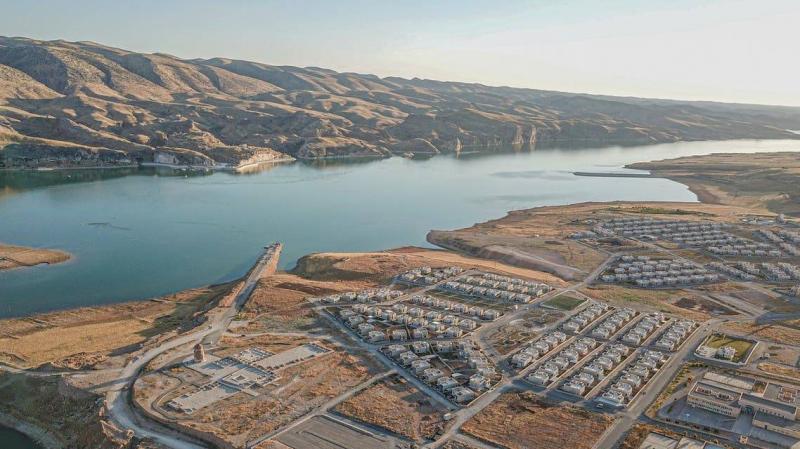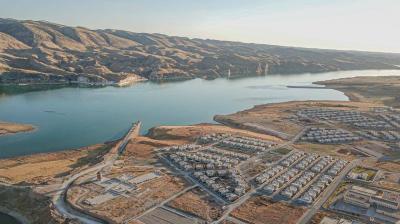Under the title "Iraq: Turkish Cizre Dam Project Harms Our Water Supply," the Al Arabiya website reported that, as the conflict over water and dams between the two countries continues, the Iraqi Ministry of Water Resources announced on Wednesday that the Turkish Cizre Dam project will negatively impact Iraq's water revenues. The ministry spokesperson, Ali Radi, informed the Iraqi News Agency (INA) that the decline in water revenues is attributed to several factors, including the very significant factor of climate change, weak snow cover, rising temperatures, particularly in the summer season, and low rainfall. He emphasized that these factors affect both upstream and downstream countries.
He added, "However, downstream countries like Iraq are usually more affected than upstream countries. Therefore, at this stage, we focus on sharing the damage and the water quotas despite their scarcity; the quotas for downstream countries should not be neglected under these circumstances."
He also noted that "Iran represents a source of water revenues that does not exceed 18% of our total water revenues. Diyala Governorate is the most affected due to the complete cutting off of some tributaries coming from Iran. Therefore, the response from the ministry to mitigate the effects of water scarcity in this governorate was strong, as we established pumping stations and drilled and rehabilitated many wells."
He clarified that "what occurred in the past days was a ceremonial opening of the Ilisu Dam, but the dam was practically filled in 2019, which was a notably abundant and moist year when Iraqi water revenues exceeded 140%. Therefore, the duration of filling the Ilisu Dam was not significantly impactful on Iraq."
Concerning the dangers posed by the Cizre Dam project, he stated that the risk lies in the new project currently underway, which is the construction of the Cizre Dam south of Ilisu. He confirmed that there are agricultural and irrigation projects over approximately one million dunams in the area that consume large quantities of water and involve drainage of water from the Tigris River.
He revealed that there have been communications through the Ministry of Foreign Affairs rejecting Iraq's construction of the Cizre Dam due to its significant negative impact on Iraq's water revenues, both in quantity and quality.
It is worth noting that the Ilisu Dam is located on the Tigris River and is less than 70 km from the Iraqi border, with a storage capacity of 10.4 billion cubic meters and a hydroelectric power capacity of about 1200 megawatts. Its operation will have significant hydrological, hydrogeological, morphological, and environmental impacts on the Tigris River.
In addition, the Cizre Dam complements the Ilisu Dam, located 35 km south of Ilisu and 4 km north of the city of Cizre near the Syrian border. The total reservoir capacity of the dam is 1.2 million m³, and its hydroelectric capacity is 240 megawatts. The purpose of this project is to generate electricity and irrigate agricultural lands, converting a large portion of 500,000 dunams of rain-fed lands into irrigated lands. All water from this project will be diverted before crossing the Turkish-Iraqi international border, resulting in dangerous repercussions for Iraq’s environment and depriving many residents along the riverbanks of drinking water supplies. It will also turn Iraq from an exporter to an importer of all types of agricultural products.
Since 2003, Iraq has experienced a decline in water levels in the Tigris and Euphrates rivers due to the water policies adopted by Turkey and Iran, which involve reducing water release rates, changing tributary paths, and constructing large dams.
On October 16, the Iraqi Minister of Water Resources, Mahdi Rashid al-Hamdani, announced that the memorandum of understanding signed between Baghdad and Ankara came into effect after ratification by the Turkish parliament and president, noting that the importance of this memorandum lies in ensuring a fair water share for Iraq.
The 2009 memorandum of understanding, amended in 2014, allows Iraq to receive a full water share from the shared rivers.
Moreover, the water crisis in Iraq is worsening year after year with declining rainfall and extended drought, making the country "the fifth in the world" most affected by climate change, according to the United Nations. On a global scale, climate change is causing stronger and more intense droughts, primarily threatening the food security of populations worldwide. There is a real danger that drought waves will increase even if the world manages to limit warming to 1.5 degrees Celsius compared to pre-industrial levels.




